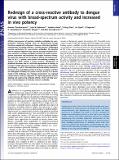Redesign of a cross-reactive antibody to dengue virus with broad-spectrum activity and increased in vivo potency
Author(s)
Raguram, S.; Sasisekharan, V.; Tharakaraman, Kannan; Robinson, Luke Nathaniel; Hatas, Andrew; Chen, Yiling; Sasisekharan, Ram; Siyue, Liu; Wogan, Gerald N; ... Show more Show less
DownloadSasiskharan-2013-Redesign of a cross-reactive antibody to dengue virus with broad-spectrum activity and increased in vivo potency.pdf (1.136Mb)
PUBLISHER_POLICY
Publisher Policy
Article is made available in accordance with the publisher's policy and may be subject to US copyright law. Please refer to the publisher's site for terms of use.
Terms of use
Metadata
Show full item recordAbstract
Affinity improvement of proteins, including antibodies, by computational chemistry broadly relies on physics-based energy functions coupled with refinement. However, achieving significant enhancement of binding affinity (>10-fold) remains a challenging exercise, particularly for cross-reactive antibodies. We describe here an empirical approach that captures key physicochemical features common to antigen–antibody interfaces to predict protein–protein interaction and mutations that confer increased affinity. We apply this approach to the design of affinity-enhancing mutations in 4E11, a potent cross-reactive neutralizing antibody to dengue virus (DV), without a crystal structure. Combination of predicted mutations led to a 450-fold improvement in affinity to serotype 4 of DV while preserving, or modestly increasing, affinity to serotypes 1–3 of DV. We show that increased affinity resulted in strong in vitro neutralizing activity to all four serotypes, and that the redesigned antibody has potent antiviral activity in a mouse model of DV challenge. Our findings demonstrate an empirical computational chemistry approach for improving protein–protein docking and engineering antibody affinity, which will help accelerate the development of clinically relevant antibodies.
Date issued
2013-04Department
Massachusetts Institute of Technology. Department of Biological Engineering; Massachusetts Institute of Technology. School of Engineering; Singapore-MIT Alliance in Research and Technology (SMART); Koch Institute for Integrative Cancer Research at MITJournal
Proceedings of the National Academy of Sciences
Publisher
National Academy of Sciences (U.S.)
Citation
Tharakaraman, K., L. N. Robinson, A. Hatas, Y.-L. Chen, L. Siyue, S. Raguram, V. Sasisekharan, G. N. Wogan, and R. Sasisekharan. “Redesign of a cross-reactive antibody to dengue virus with broad-spectrum activity and increased in vivo potency.” Proceedings of the National Academy of Sciences 110, no. 17 (April 23, 2013): E1555-E1564.
Version: Final published version
ISSN
0027-8424
1091-6490